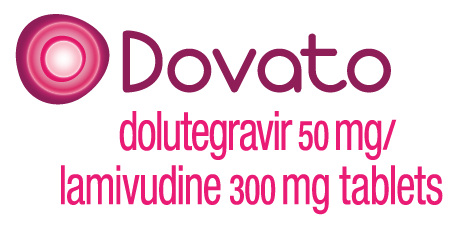A Phase 3b, Open-Label, Multicenter, Single-Arm, 48-Week, Noncomparative Study Conducted at US Sites Only1-3 DOVATO (N=131)
Inclusion Criteria
Exclusion Criteria1,2
Pregnant in first trimester, breastfeeding, or planning to become pregnant; active CDC stage 3 disease†; known HIV-1 drug resistance genotype test results prior to screening; known or suspected HBV co-infection; known severe renal impairment (CrCl <30 mL/min/1.73 m2); known or suspected severe hepatic impairment or unstable liver disease
26% OF PARTICIPANTS ENROLLED ON THE DAY OF DIAGNOSIS1
*Possible modifications included participants with BL transmitted resistance (resistance to 3TC or DTG), new pregnancy, HBV co-infection, CrCl <30 mL/min (patients receiving DOVATO had CrCl ≥50 mL/min), confirmed virologic failure (categorized as virologic nonresponse or virologic rebound [virologic nonresponse was defined as a 2-log drop from baseline viral load by Week 8, confirmed viral load ≥1000 copies/mL by Week 12, or confirmed viral load ≥200 copies/mL by Week 24; virologic rebound was defined as confirmed viral load of ≥200 copies/mL after suppression to <200 copies/mL]), and AEs.1,2
†Except for esophageal candidiasis and cutaneous Kaposi’s sarcoma not requiring systemic therapy.4
15% of Participants Had a Viral Load Exceeding 500K copies/mL at Baseline1,3
| Known at Treatment Initiation |
|---|
|
|
|
|
| Unknown at Treatment Initiation | |
|---|---|
|
HIV-1 RNA <100,000 copies/mL
|
60% |
|
HIV-1 RNA 100,000 to <500,000 copies/mL
|
24% |
|
HIV-1 RNA 500,000 to <1,000,000 copies/mL
|
7% |
|
HIV-1 RNA ≥1,000,000 copies/mL
|
8% |
| CD4+ T-cell count <200 cells/mm3‡ | 28% |
| HBV co-infection | 5% |
| M184V resistance mutation | <1% |
‡BL resistance was identified at Week 4, and HIV-1 viral load, CD4+ T-cell count, and HBV co-infection were identified at Week 1 from samples taken at BL.
Virologic Suppression at 48 Weeks1,2,5
Primary endpoint results: 87% of participants (97/111) on DOVATO achieved a viral load of <50 copies/mL at 24 weeks
Observed analysis at 48 weeks
(Secondary endpoint; N=110; participants with missing data were excluded from this analysis)
TT–E missing=failure at 48 weeks
(Secondary endpoint; N=131; participants with missing data were considered failures in this analysis)
Virologic Suppression by Baseline Viral Load (ITT–E Missing=Failure) at 48 Weeks
ALL PARTICIPANTS WITH HIV-1 RNA ≥500,000 COPIES/mL AT BASELINE WITH AVAILABLE HIV-1 RNA AT WEEK 48 WERE SUPPRESSED TO <50 COPIES/mL1
AT WEEK 48, VIROLOGIC SUPPRESSION RATES BY BASELINE CD4+ CELL COUNT WERE 83% FOR CD4+ ≥200 CELLS/mm3 (n=94); 78% FOR CD4+ <200 CELLS/mm3 (n=37)5
Treatment Modifications and Resistance at Week 481
10 PARTICIPANTS HAD TREATMENT MODIFICATIONS BY WEEK 481§
0 CASES OF TREATMENT-EMERGENT HBV OR HIV RESISTANCE WERE OBSERVED ǁ
§Participants who switched after Week 48: 1 due to lack of efficacy (participant switched to BIC/FTC/TAF post-Week 48 HIV-1 RNA assessment [after the 831 copies/mL assessment]; HIV-1 RNA was 51 copies/mL at last follow-up visit) and 1 due to nonadherence (participant stopped DTG/3TC due to nonadherence and restarted DTG/3TC approximately 4 months later; last HIV-1 RNA was 104 copies/mL at last follow-up visit on modified ART).1,5
∥Participants meeting protocol-defined virologic failure criteria (n=2) were sent for resistance testing. HBV 3TC resistance was tested in participants who were diagnosed with HBV infection from BL.3
SEE THE IMPACT OF DOVATO IN REAL-WORLD PATIENTS
3TC=lamivudine; AE=adverse event; ART=antiretroviral therapy; BIC=bictegravir; BL=baseline; CrCl=creatinine clearance; DTG=dolutegravir; FTC=emtricitabine; HBV=hepatitis B virus; ITT–E=intent-to-treat–exposed; TAF=tenofovir alafenamide.
References:
1. Rolle C-P, Berhe M, Singh T, et al. Sustained virologic suppression with dolutegravir/lamivudine in a test-and-treat setting through 48 weeks. Open Forum Infect Dis. 2023;10(3):ofad101. doi:10.1093/ofid/ofad101
2. Rolle C-P, Berhe M, Singh T, et al. Feasibility, efficacy, and safety of using dolutegravir/lamivudine (DTG/3TC) as a first-line regimen in a test-and-treat setting for newly diagnosed people living with HIV (PLWH): the STAT study. Presented at: 14th Annual ACTHIV Conference; August 20-22, 2020; Virtual.
3. Rolle C-P, Berhe M, Singh T, et al. Dolutegravir/lamivudine as a first-line regimen in a test-and-treat setting for newly diagnosed people living with HIV. AIDS. 2021;35(12):1957-1965. doi:10.1097/QAD.0000000000002979
4. The INSIGHT START Study Group. Initiation of antiretroviral therapy in early asymptomatic HIV infection. N Engl J Med. 2015;373(9):795-807. doi:10.1056/NEJMoa1506816
5. Rolle C-P, Berhe M, Singh T, et al. Feasibility, efficacy, and safety of dolutegravir/lamivudine (DTG/3TC) as a first-line regimen in a test-and-treat setting for the newly diagnosed people living with HIV (PLWH): 48-week results of the STAT study. Presented at: 11th IAS Conference on HIV Science; July 18–July 21, 2021; Virtual. Slides PEB182.
DLLWCNT230006 July 2023


